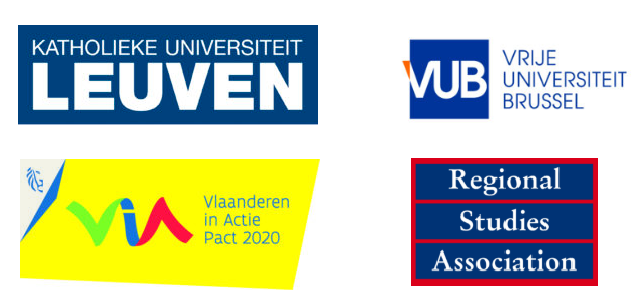Fifth FINGEO Global Seminar
“European Spaces of Financialization”
28-29 May 2018
Vrije Universiteit Brussel, Brussels, Belgium
***

Local Organizers: Manuel Aalbers (KU Leuven), David Bassens (Vrije Universiteit Brussel), Reijer Hendrikse (Vrije Universiteit Brussel), Michiel van Meeteren (Vrije Universiteit Brussel)
Advisory Board: Sabine Dörry (LISER, Luxembourg), Gary Dymski (Leeds University), Karen Lai (National University Singapore), Martin Sokol (Trinity College Dublin), Dariusz Wójcik (Oxford University)
Sponsored by: EUFINGEO, the European Financial Geography Network (Vrije Universiteit Brussel, click here), The Financial Geography Research Network (Regional Studies Association, click here)
Overall organisational outline: The two-day Global Seminar is intended for a larger audience and is followed by the 1st FinGeo Spring School (30 May – 02 June 2018) for a selected audience of early career scholars. A preliminary program can be found here.
Location: The Global Seminar takes place in Brussels: a city that harbours both the high promises and extreme disappointments of European integration, a financial centre in and of itself, and a place which remarkable urban fabric carries the signature of decades of commercial real estate and financial interests.
Background and ambition: For decades, Brussels has been the European hotbed fuelling financial integration, culminating in the inception of the Eurozone at turn of the century, and currently exemplified by a push for integrated capital markets. As unofficial capital of the EU, Brussels is a key regulatory node in shaping European and indeed global capitalism, having increasingly become a hotspot for corporate lobbying, housing a growing complex of private associations, consultancies, firms, roundtables and so forth, dedicated to influence the many diplomats and technocrats constituting the so-called ‘Brussels Bubble’.
Over time, this regime has produced radically uneven socio-spatial outcomes, particularly in the Eurozone ‘periphery’. Greece is the epitomic case of how the ongoing crisis of financialized capitalism, amplified through monetary union, can destabilize a country, effectively resulting in the handover of executive power and sovereignty to technocratic (creditor) bodies. Greece’s fate, however troubling, is but an extreme version of what is observable across the Eurozone and EU. Augmented since the crisis, it appears that limiting political manoeuvrability is a structural phenomenon, as member states are confronted with a structural loss of national executive authority, and judicial and parliamentary oversight. Instead, technocratic bodies like the Eurogroup and the European Central Bank (ECB) have increasingly filled the political vacuum. As a result of this increasingly ‘financialized’ regime, it appears that European banks and capital markets have recovered from the financial-cum-euro crisis, and are once again seeking ways to further enclose the EU/Eurozone in its value extraction schemes.
Last but not least, Brussels is also the fulcrum where much of the forthcoming wheeling and dealing around the latest financial sector challenges will play out: as Brexit is likely to have substantial consequences for the geographical organization of the European financial sector (and particularly UK banks), the Brussels’ business services complex will be working overtime. But also the inroads of financial technology (FinTech) into the field of ‘traditional’ finance poses key questions to Brussels-based politicians, regulators and technocrats, some of which have clear geopolitical dimensions to it.
Target Group and Application Procedure: Attendence of the seminar is open to all after registration, but there is a selection procedure for paper presenters. The registration fee is 100 euro for the full two days, including lunch & refreshments. Applications for paper presentations are closed, but registration for non-presenting participants is now open (click here) until 1 May 2018. If you have any questions, please contact david.bassens@vub.be or manuel.aalbers@kuleuven.be.
***
Theme
The theme of the Global Seminar is ‘European Spaces of Financialization’. Organized on May 28 and May 29 in Brussels, the main intellectual drive for the seminar is to debate Europe’s multiscalar spaces of financialization, their production, workings, effects, and importantly, their alternatives. We want to understand the socio-spatial drivers of financialization that produce inequality, growing household indebtedness, and the privatization of public services and support structures in the face of austerity politics. Participants are invited to engage with the following financial geography themes: geographies of European integration, its offshore spaces and the wider state-finance nexus; the financialization of (non-) banking, finance and corporate enterprise; of boom-bust cycles; of politico-financial elites; of real estate, housing and households; geographies of sovereignty, austerity, resistance, debt, and so forth. Therefore we are both interested in the effects of financialization on states and markets as well as focusing on who and what drive further financialization of these spheres.
The program is structured around four dedicated keynote lectures of about 45 min + 15 min Q/A, each followed by a topical session with four papers. This allows us to accommodate up to sixteen presenting participants, although we want to encourage a larger community and the FINGEO spring school participants to be present. Moreover, the two keynotes from the First FINGEO dissertation prize will be accommodated on the Brussels seminar. The seminar will cover the following themes:
(i) The financialization of governments, the public sector and states
Keynote: Professor Bob Jessop, Lancaster University
In recent years a mounting body of work has emerged that empirically unpacks the financial entanglements and transformations of governments, state agencies, (quasi-) public institutions and their offshoots. Our first session builds on these contributions, in an understanding that states – through a multitude of functions – shape the very context upon which financial development unfolds. We are broadly interested in the latest empirical insights within this growing subfield of financialization studies, as well as emerging conceptual perspectives to make sense of the rise of finance in a growing set of public domains: how and why governments have been key accelerators of financialization; to what extent states have become financial subjects themselves, and how we should understand the ever-changing state-finance nexus in a financialized world.

About the keynote:
Bob Jessop is Distinguished Professor of Sociology at Lancaster University, United Kingdom. Bob has written extensively on a wide range of interconnected topics, such as regulation, governance and neoliberalism. However, Bob is arguably best known for his vast work centered on the state, on state theory and state transformations, including his popular ‘strategic relational approach’ to study the nature of states.
For more information see: http://www.lancaster.ac.uk/sociology/about-us/people/bob-jessop
(i) Corporate financialization: banks, finance and corporations transformed
Keynote: Professor Julie Froud, The University of Manchester
Our second session focuses on the global political economy of corporations – a space we broadly refer to as corporate financialization. Amongst others, we zoom in on the changing nature of corporate financing and profitmaking: of banking, and wider financial intermediation, in which so-called ‘non-financial’ firms increasingly perform all kinds of financial activities. The growing influence of financial motives and practices over business, with the rise of governance models maximizing ‘shareholder value’ as prominent example, remains one of the key spaces shaping financialization research. Global corporations have since become progressively interwoven with shadow banking, tax evasion and other practices defining the financial offshore world, inviting scholars to rethink the ways in which corporate financialization shapes up. From a European perspective, financialized corporate governance practices have typically been seen as something that belongs to Anglo-American capitalism. Although such a position is difficult to maintain, it begs the question to what extent corporate financialization shapes Europe.

About the keynote:
Julie Froud is Professor of Financial Innovation at the University of Manchester, United Kingdom. Julie has written extensively on financialization and strategy at the level of the global corporation, amongst others focusing on the narratives, numbers and cult(ure) behind shareholder value orientation and the rise of capital markets.
For more information see: https://www.research.manchester.ac.uk/portal/julie.froud.html
(iii) The politics of financialization
Keynote: Professor Andreas Nölke, Goethe-Universität Frankfurt
As a seminar organized in Brussels, it only seems logical that our third session zooms in the politics of financialization. Who are the actual (co-) producers of our financialized universe? Who benefits from more financialized markets and states, and who drive policy proposals and institutional change towards financialization, either on the EU level or within EU member states? Amongst others, this session will discuss geographies of lobbying, influence peddling, agenda setting, legislative processes and related political interests. The financial crisis and its (continuing) aftermath laid bare the excessive capture of politicians and regulators, with numerous political solutions or ‘fixes’ to solve the crisis, typically devised by private actors, merely replicating the very dynamics that caused it. Likewise, the ongoing push for integrated European capital markets will increase the likelihood of recurrent crises, rather than prevent it. Meanwhile, the ECB has steadily become Europe’s decisive political actor, increasingly assuming responsibilities of state actors.
 About the keynote:
About the keynote:
Andreas Nölke is Professor in Political Science at Goethe University, Frankfurt, Germany. Andreas’ work centers on political economy, having written extensively on a variety of themes, such as corporate/transnational governance, international accounting standards, and varieties of capitalism. More recently, Andreas has engaged with the notion financialization, which he views ‘the core problem for a social Europe’.
For more information see: http://www.goethe-university-frankfurt.de/45472741/anoelke
(iv) The financialization of daily life
Keynote: Professor Kavita Datta, Queen Mary University of London
The final session broadly focuses on the spaces shaping the financialization of daily life, in which financial calculations and rationalities increasingly nudge and shape social exchange and reproduction, progressively transforming citizens – students, patients, pensioners, households, et cetera – into financial(ized) subjects. This particular area within the financialization literature and debate is mostly, but not exclusively, shaped by cultural approaches, applied at the local level or micro scale. How and why are decisions about where, when and how to live, shop, work or leisure influenced by financial considerations? Amongst others, this both encompasses empirical work on the financialization of home and the housing sector, but also conceptual work on debt and its mounting sway over social life.
 About the keynote:
About the keynote:
Kavita Datta is Professor of Development Geography at Queen Mary, Universtiy of London, United Kingdom. Kavita has written extensively on transnational migration from the global south to the north, and in particular to global cities like London. Amongst others, Kavita is studying how migrant communities subject to financial exclusion carve out alternative spaces of financial intermediation.
For more information see: http://www.geog.qmul.ac.uk/staff/dattak.html
As part of the FINGEO Best Dissertation Prize, two Early Career Keynotes are organized during the Global Seminar:
(i) Income-contingent student loans: The financialization of the state and the statization of finance
Early career keynote: Gareth Bryant, University of Sydney
My paper uses the case of income-contingent student loans to explore the internalization of financial ways of calculating and organizing by states. I argue income-contingent loans recast state-citizen relations as creditor-debtor relations in a way that remains embedded in the fiscal powers and instruments of states. The analysis compares schemes operating in the UK and Australia, highlighting accounting as a key site of political contestation. In Australia, accounting for student loans as a state-issued financial asset has marginalized private financial markets, providing degrees of fiscal discretion over the size, progressivity and direction of public expenditure on universities. In the UK, accounting for student loans as an illiquid asset has created pressures for the securitization and sale of the loan book, using the taxation powers of the state to collect debts for the private sector. My paper concludes by positing the financialization of the state as a contradictory, two-way process involving the statization of finance.

About the keynote:
Gareth Bryant is a Lecturer in the Department of Polticial Economy at the University of Sydney, Australia. His research explores the marketization of different areas of socio-ecological life, with a current focus on climate and education policy. Gareth is the co-editor of the Progress in Political Economy (PPE) blog: ppesydney.net.
For more information see: http://sydney.edu.au/arts/staff/profiles/gareth.bryant.php
(ii) Living the financialization of home: difference, failure, risk and personal responsibilization
Early career keynote: Cesare Di Feliciantonio, University of Leicester
Building on feminist political economy, in this talk I reflect on the key-role of difference in shaping the financialization of home as occurred in countries such as Italy and Spain. Through the analysis of biographical narratives of women and gay men, I aim at highlighting how personal responsibilization and risk, two main characteristics of neoliberal rationality, shape an ambivalent relation with financialized homeownership for those subjects who somehow ¢failed¢ to embody the ¢responsible¢ subject. In fact the narratives analysed show how accessing the housing market is framed as getting the possibility to prove to be a responsible subject after having ‘failed’. This way in the talk I discuss the power of financialized homeownership, and neoliberal rationality more generally, in forging dreams, perspectives and life aspirations for subjects ‘failed’ as respect to kinship, love and sexuality.

About the keynote:
Cesare Di Feliciantonio has a double PhD in Geography from Sapienza-University of Rome and KU Leuven. His PhD research focused on ‘alternatives’ to the process of subjectification shaped by indebted homeownership in times of austerity urbanism in Rome and Barcelona. In March 2018 he’s joining the Geography Department of the University of Leicester with a Marie Curie Individual Fellowship.
For his publications see: https://nuim.academia.edu/CesareDiFeliciantonio
